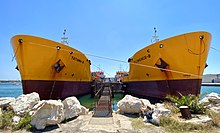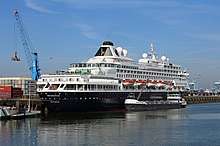Bunkering
Bunkering is the supplying of fuel for use by ships,[1] and includes the shipboard logistics of loading fuel and distributing it among available bunker tanks.[2]




The term originated in the days of steamships, when the fuel, coal, was stored in bunkers.[1] Nowadays the term bunker is generally applied to the storage of petroleum products in tanks, and the practice and business of refueling ships. Bunkering operations are located at seaports, and they include the storage of "bunker" (ship) fuels and the provision of the fuel to vessels.[3]
Bunkering in maritime law
In many maritime contracts, such as charterparties, contracts for carriage of goods by sea,[4] and marine insurance policies,[5] the shipowner or ship operator is required to ensure that the ship is "seaworthy". Seaworthiness requires not only that the ship be sound and properly crewed, but also that it be fully fuelled (or "bunkered") at the start of the voyage.[6] If the ship operator wishes to bunker en route, this must be provided for in a written agreement, or the interruption of the voyage may be deemed to be deviation (a serious breach of contract). If the vessel runs out of fuel in mid-ocean, this is also serious breach, allowing the insurer to cancel a policy,[7][8] and allowing a consignee to make a cargo claim. It may also give rise to a salvage situation.
"Bunkering" as theft
Particularly in Nigeria, "bunkering" also means the clandestine siphoning off or diverting of oil from pipelines and storage facilities. Such bunkering is often performed crudely, causing both accidents and pollution.
References
- Manaadiar, Hariesh. "What is Bunker and Bunkering". Shipping and Freight Resource. Puthan House. Retrieved 27 June 2016.
- MOHIT (19 October 2010). "Bunkering is Dangerous : Procedure for Bunkering Operation on a Ship". Marine Insight. Retrieved 16 January 2015Site seems to require enabling of cookies.
- "Bunkering". Maritime and Port Authority of Singapore (MPA). Archived from the original on 7 January 2015. Retrieved 16 January 2015.
- See the United States' Harter Act
- Marine Insurance Act 1906
- The Hague–Visby Rules Articles II & III
- Greenock Steamship Co v Marine Insurance [1903] 2 K.B. 657
- If the policy has a "held-covered" clause, the deviation will not allow immediate cancellation